- Home
- Gail Carson Levine
Ella Enchanted
Ella Enchanted Read online
DEDICATION
To David. More Tunes.
CONTENTS
Cover
Title Page
Dedication
Chapter One
Chapter Two
Chapter Three
Chapter Four
Chapter Five
Chapter Six
Chapter Seven
Chapter Eight
Chapter Nine
Chapter Ten
Chapter Eleven
Chapter Twelve
Chapter Thirteen
Chapter Fourteen
Chapter Fifteen
Chapter Sixteen
Chapter Seventeen
Chapter Eighteen
Chapter Nineteen
Chapter Twenty
Chapter Twenty-One
Chapter Twenty-Two
Chapter Twenty-Three
Chapter Twenty-Four
Chapter Twenty-Five
Chapter Twenty-Six
Chapter Twenty-Seven
Chapter Twenty-Eight
Chapter Twenty-Nine
Epilogue
Extras from Ella Enchanted
Ella by Any Other Name
Elementary Ella
The Unseen Scene
Gnomic Spoken Here: The Languages of Ella Enchanted
A Sneak Peek at Gail Carson Levine’s Next Novel, A Tale of Two Castles
About the Author
Other Works
Credits
Copyright
Back Ad
About the Publisher
CHAPTER ONE
That fool of a fairy Lucinda did not intend to lay a curse on me. She meant to bestow a gift. When I cried inconsolably through my first hour of life, my tears were her inspiration. Shaking her head sympathetically at Mother, the fairy touched my nose. “My gift is obedience. Ella will always be obedient. Now stop crying, child.”
I stopped.
Father was away on a trading expedition as usual, but our cook, Mandy, was there. She and Mother were horrified, but no matter how they explained it to Lucinda, they couldn’t make her understand the terrible thing she’d done to me. I could picture the argument: Mandy’s freckles standing out sharper than usual, her frizzy gray hair in disarray, and her double chin shaking with anger; Mother still and intense, her brown curls damp from labor, the laughter gone from her eyes.
I couldn’t imagine Lucinda. I didn’t know what she looked like.
She wouldn’t undo the curse.
My first awareness of it came on my fifth birthday. I seem to remember that day perfectly, perhaps because Mandy told the tale so often.
“For your birthday,” she’d start, “I baked a beautiful cake. Six layers.”
Bertha, our head maid, had sewn a special gown for me. “Blue as midnight with a white sash. You were small for your age even then, and you looked like a china doll, with a white ribbon in your black hair and your cheeks red from excitement.”
In the middle of the table was a vase filled with flowers that Nathan, our manservant, had picked.
We all sat around the table. (Father was away again.) I was thrilled. I had watched Mandy bake the cake and Bertha sew the gown and Nathan pick the flowers.
Mandy cut the cake. When she handed me my piece, she said without thinking, “Eat.”
The first bite was delicious. I finished the slice happily. When it was gone, Mandy cut another. That one was harder. When it was gone, no one gave me more, but I knew I had to keep eating. I moved my fork into the cake itself.
“Ella, what are you doing?” Mother said.
“Little piggy.” Mandy laughed. “It’s her birthday, Lady. Let her have as much as she wants.” She put another slice on my plate.
I felt sick, and frightened. Why couldn’t I stop eating?
Swallowing was a struggle. Each bite weighed on my tongue and felt like a sticky mass of glue as I fought to get it down. I started crying while I ate.
Mother realized first. “Stop eating, Ella,” she commanded.
I stopped.
Anyone could control me with an order. It had to be a direct command, such as “Put on a shawl,” or “You must go to bed now.” A wish or a request had no effect. I was free to ignore “I wish you would put on a shawl,” or “Why don’t you go to bed now?” But against an order I was powerless.
If someone told me to hop on one foot for a day and a half, I’d have to do it. And hopping on one foot wasn’t the worst order I could be given. If you commanded me to cut off my own head, I’d have to do it.
I was in danger at every moment.
As I grew older, I learned to delay my obedience, but each moment cost me dear—in breathlessness, nausea, dizziness, and other complaints. I could never hold out for long. Even a few minutes were a desperate struggle.
I had a fairy godmother, and Mother asked her to take the curse away. But my fairy godmother said Lucinda was the only one who could remove it. However, she also said it might be broken someday without Lucinda’s help.
But I didn’t know how. I didn’t even know who my fairy godmother was.
Instead of making me docile, Lucinda’s curse made a rebel of me. Or perhaps I was that way naturally.
Mother rarely insisted I do anything. Father knew nothing of the curse and saw me too infrequently to issue many commands. But Mandy was bossy, giving orders almost as often as she drew breath. Kind orders or for-your-own-good orders. “Bundle up, Ella.” Or “Hold this bowl while I beat the eggs, sweet.”
I disliked these commands, harmless as they were. I’d hold the bowl, but move my feet so she would have to follow me around the kitchen. She’d call me minx and try to hem me in with more specific instructions, which I would find new ways to evade. Often, it was a long business to get anything done between us, with Mother laughing and egging each of us on by turn.
We’d end happily—with me finally choosing to do what Mandy wanted, or with Mandy changing her order to a request.
When Mandy would absentmindedly give me an order I knew she didn’t mean, I’d say, “Do I have to?” And she’d reconsider.
When I was eight, I had a friend, Pamela, the daughter of one of the servants. One day she and I were in the kitchen, watching Mandy make marchpane. When Mandy sent me to the pantry for more almonds, I returned with only two. She ordered me back with more exact instructions, which I followed exactly, while still managing to frustrate her true wishes.
Later, when Pamela and I retreated to the garden to devour the candy, she asked why I hadn’t done what Mandy wanted straight off.
“I hate when she’s bossy,” I answered.
Pamela said smugly, “I always obey my elders.”
“That’s because you don’t have to.”
“I do have to, or Father will slap me.”
“It’s not the same as for me. I’m under a spell.” I enjoyed the importance of the words. Spells were rare. Lucinda was the only fairy rash enough to cast them on people.
“Like Sleeping Beauty?”
“Except I won’t have to sleep for a hundred years.”
“What’s your spell?”
I told her.
“If anybody gives you an order, you have to obey? Including me?”
I nodded.
“Can I try it?”
“No.” I hadn’t anticipated this. I changed the subject. “I’ll race you to the gate.”
“All right, but I command you to lose the race.”
“Then I don’t want to race.”
“I command you to race, and I command you to lose.”
We raced. I lost.
We picked berries. I had to give Pamela the sweetest, ripest ones. We played princesses and ogres. I had to be the ogre.
An hour after my admis
sion, I punched her. She screamed, and blood poured from her nose.
Our friendship ended that day. Mother found Pamela’s mother a new situation far from our town of Frell.
After punishing me for using my fist, Mother issued one of her infrequent commands: never to tell anyone about my curse. But I wouldn’t have anyway. I had learned caution.
When I was almost fifteen, Mother and I caught cold. Mandy dosed us with her curing soup, made with carrots, leeks, celery, and hair from a unicorn’s tail. It was delicious, but we both hated to see those long yellow-white hairs floating around the vegetables.
Since Father was away from Frell, we drank the soup sitting up in Mother’s bed. If he had been home, I wouldn’t have been in her room at all. He didn’t like me to be anywhere near him, getting underfoot, as he said.
I sipped my soup with the hairs in it because Mandy had said to, even though I grimaced at the soup and at Mandy’s retreating back.
“I’ll wait for mine to cool,” Mother said. Then, after Mandy left, she took the hairs out while she ate and put them back in the empty bowl when she was done.
The next day I was well and Mother was much worse, too sick to drink or eat anything. She said there was a knife in her throat and a battering ram at her head. To make her feel better, I put cool cloths on her forehead and told her stories. They were only old, familiar tales about the fairies that I changed here and there, but sometimes I made Mother laugh. Except the laugh would turn into a cough.
Before Mandy sent me off for the night, Mother kissed me. “Good night. I love you, precious.”
They were her last words to me. As I left the room, I heard her last words to Mandy. “I’m not very sick. Don’t send for Sir Peter.”
Sir Peter was Father.
The next morning, she was awake, but dreaming. With wide-open eyes, she chattered to invisible courtiers and plucked nervously at her silver necklace. To Mandy and me, there in the room with her, she said nothing.
Nathan, the manservant, got the physician, who hurried me away from Mother’s side.
Our hallway was empty. I followed it to the spiral staircase and walked down, remembering the times Mother and I had slid down the banister.
We didn’t do it when people were around. “We have to be dignified,” she would whisper then, stepping down the stairs in an especially stately way. And I would follow, mimicking her and fighting my natural clumsiness, pleased to be part of her game.
But when we were alone, we preferred to slide and yell all the way down. And run back up for another ride, and a third, and a fourth.
When I got to the bottom of the stairs, I pulled our heavy front door open and slipped out into bright sunshine.
It was a long walk to the old castle, but I wanted to make a wish, and I wanted to make it in the place where it would have the best chance of being granted.
The castle had been abandoned when King Jerrold was a boy, although it was reopened on special occasions, for private balls, weddings, and the like. Even so, Bertha said it was haunted, and Nathan said it was infested with mice. Its gardens were overgrown, but Bertha swore the candle trees had power.
I went straight to the candle grove. The candles were small trees that had been pruned and tied to wires to make them grow in the shape of candelabra.
For wishes you need trading material. I closed my eyes and thought.
“If Mother gets well quick, I’ll be good, not just obedient. I’ll try harder not to be clumsy and I won’t tease Mandy so much.”
I didn’t bargain for Mother’s life, because I didn’t believe she was in danger of dying.
CHAPTER TWO
Leaving behind a grieving husband and child. We must comfort them.” High Chancellor Thomas wound down after droning on for almost an hour. Some of his speech had been about Mother. At least, the words “Lady Eleanor” were spoken often, but the person they described—dutiful parent, loyal citizen, steadfast spouse—sounded more like the high chancellor than like my mother. Part of the speech had been about dying, but more was about giving allegiance to Kyrria and its rulers, King Jerrold, Prince Charmont, and the entire royal family.
Father reached for my hand. His palm was moist and hot as a hydra’s swamp. I wished I had been allowed to stand with Mandy and the other servants.
I pulled out of his grasp and moved a step away. He closed the distance between us and took my hand again.
Mother’s casket was made of gleaming mahogany carved with designs of fairies and elves. If only the fairies could leap out of the wood and cast a spell to bring her back to life. And another one to send Father away. Or maybe my fairy godmother would do it, if I knew where to find her.
When the high chancellor finished, it was my task to close the casket so Mother could be lowered into her grave. Father put his hands on my shoulders and pushed me forward.
Mother’s mouth was stern, the opposite of its look in life. And her face was empty, which was awful. But worse was the creak as the coffin lid went down and the dry click when it closed. And the thought of Mother packed away in a box.
The tears I had swallowed all day erupted. I stood there before the whole court, crying in an infant’s endless wail, unable to stop myself.
Father pressed my face into his chest. Perhaps he appeared to be comforting me, but he was only trying to muffle my noise, which couldn’t be muffled. He let me go. In a sharp whisper, he said, “Get away from here. Come back when you can be quiet.”
For once I was glad to obey. I ran. My heavy black gown tripped me, and I fell. Before anyone could help me, I was off again, my knee and hand stinging.
The biggest tree in the graveyard was a weeping willow—a crying tree. I plunged through its leaves and threw myself down, sobbing.
Everyone called it losing Mother, but she wasn’t lost. She was gone, and no matter where I went—another town, another country, Fairyland, or Gnome Caverns—I wouldn’t find her.
We’d never talk again, or laugh together. Or swim in the River Lucarno. Or slide down the banister or play tricks on Bertha. Or a million things.
I cried myself out and sat up. My gown had changed in front from black silk to brown dirt. As Mandy would have said, I was a spectacle.
How much time had gone by? I had to go back. Father had told me to, and the curse was tugging at me to obey.
Outside the privacy of my tree, Prince Charmont stood, reading a tombstone. I had never been so near him before. Had he heard me cry?
Although the prince was only two years older than I, he was much taller, and he stood just like his father, feet apart, hands behind his back, as though the whole country were passing by on review. He looked like his father too, although the sharp angles of King Jerrold’s face were softened in his son. They each had tawny curls and swarthy skin. I had never been near enough to the king to know whether he also had a sprinkling of freckles across his nose, surprising on such a dark face.
“Cousin of mine,” the prince said, gesturing at the tombstone. “Never liked him. I liked your mother.” He started walking back toward her tomb.
Did he expect me to come with him? Was I supposed to maintain a suitable distance from his royal self?
With enough room for a carriage to pass between us, I walked at his side. He moved closer. I saw he had been crying too, although he had stayed upright and clean.
“You can call me Char,” he told me suddenly. “Everyone else does.”
I could? We walked in silence.
“My father calls me Char too,” he added.
The king!
“Thank you,” I said.
“Thank you, Char,” he corrected. Then, “Your mother used to make me laugh. Once, at a banquet, Chancellor Thomas was making a speech. While he talked, your mother moved her napkin around. I saw it before your father crumpled it up. She had arranged the edge in the shape of the chancellor’s profile, with the mouth open and the chin stuck out. It would have looked exactly like him if he were the color of a blue napkin. I had to l
eave without dinner so I could go outside and laugh.”
We were halfway back. It was starting to rain. I could make out one figure, small in the distance, standing by Mother’s grave. Father.
“Where did everyone go?” I asked Char.
“They all left before I came to find you,” he said. “Did you want them to wait?” He sounded worried, as if, perhaps, he should have made them stay.
“No, I didn’t want any of them to wait,” I answered, meaning Father could have gone too.
“I know all about you,” Char announced after we’d taken a few more steps.
“You do? How could you?”
“Your cook and our cook meet at the market. She talks about you.” He looked sideways at me. “Do you know much about me?”
“No.” Mandy had never said anything. “What do you know?”
“I know you can imitate people just as Lady Eleanor could. Once you imitated your manservant to his face, and he wasn’t sure whether he was the servant or you were. You make up your own fairy tales and you drop things and trip over things. I know you once broke a whole set of dishes.”
“I slipped on ice!”
“Ice chips you spilled before you slipped on them.” He laughed. It wasn’t a ridiculing laugh; it was a happy laugh at a good joke.
“An accident,” I protested. But I smiled too, tremblingly, after so much crying.
We reached Father, who bowed. “Thank you, Highness, for accompanying my daughter.”
Char returned the bow.
“Come, Eleanor,” Father said.
Eleanor. No one had ever called me that before, even though it was my real name. Eleanor had always been Mother, and always would be.
“Ella. I’m Ella,” I said.
“Ella then. Come, Ella.” He bowed to Prince Charmont and climbed into the carriage.
I had to go. Char handed me in. I didn’t know whether to give him my hand or to let him push up on my elbow. He wound up with the middle of my arm and I had to grasp the side of the carriage with the other hand for balance. When he closed the door, I caught my skirt, and there was a loud ripping sound. Father winced. I saw Char through the window, laughing again. I turned the skirt and found a gash about six inches above the hem. Bertha would never be able to make it smooth.

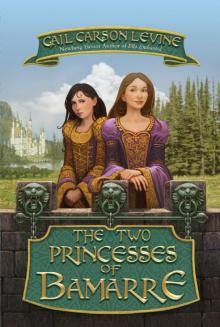 The Two Princesses of Bamarre
The Two Princesses of Bamarre Dave at Night
Dave at Night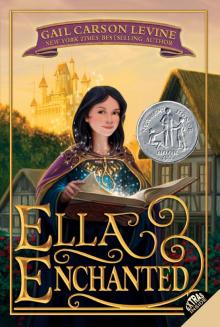 Ella Enchanted
Ella Enchanted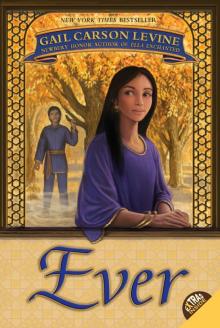 Ever
Ever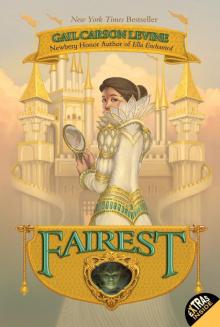 Fairest
Fairest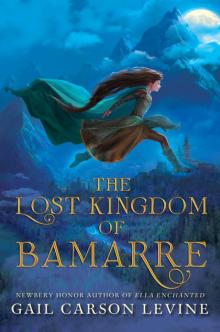 The Lost Kingdom of Bamarre
The Lost Kingdom of Bamarre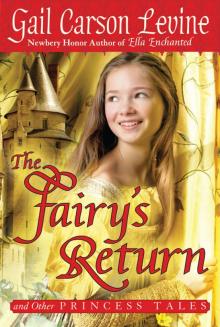 The Fairy's Return and Other Princess Tales
The Fairy's Return and Other Princess Tales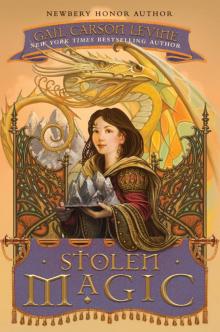 Stolen Magic
Stolen Magic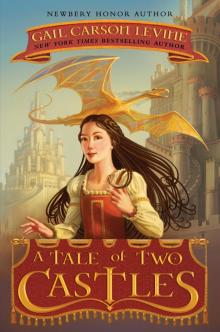 A Tale of Two Castles
A Tale of Two Castles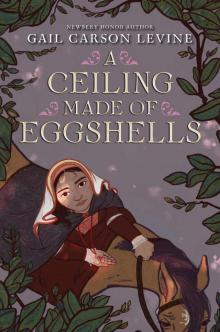 A Ceiling Made of Eggshells
A Ceiling Made of Eggshells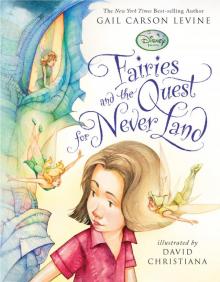 Fairies and the Quest for Never Land
Fairies and the Quest for Never Land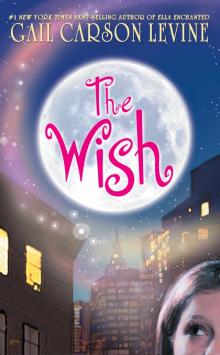 The Wish
The Wish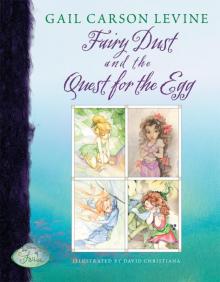 Fairy Dust and the Quest for the Egg
Fairy Dust and the Quest for the Egg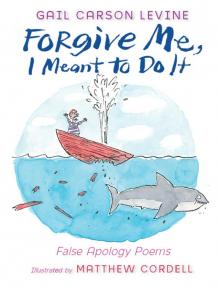 Forgive Me, I Meant to Do It: False Apology Poems
Forgive Me, I Meant to Do It: False Apology Poems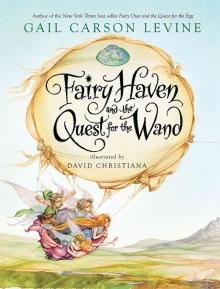 Fairy Haven and the Quest for the Wand
Fairy Haven and the Quest for the Wand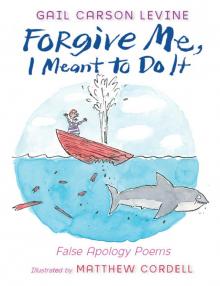 Forgive Me, I Meant to Do It
Forgive Me, I Meant to Do It